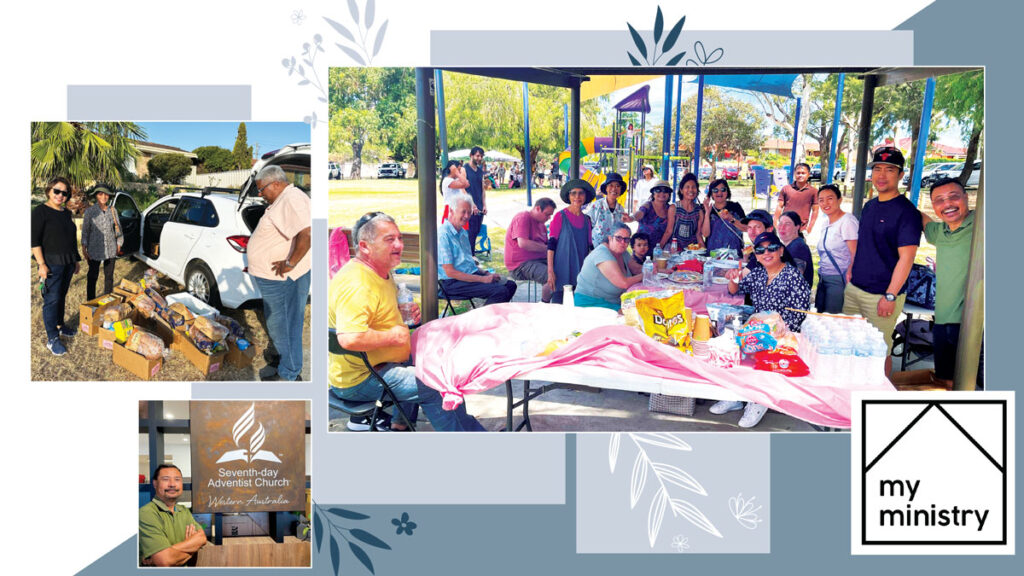It was a question I wasn’t expecting at all, from a person I’d never normally talk to, in a place I’d never ordinarily be. And it led to conversation about the Bible, Israel, prophecy and Jesus’ return that paralleled a conversation 2000 years ago.
An unexpected place
On February 16, I saw a Facebook post by WikiLeaks promoting a Melbourne demonstration in support of founder Julian Assange. I seldom attend rallies, but I’ve had an interest in WikiLeaks since my university days and I decided to travel into the city, assuming I’d hear some speeches, sign a petition or two, and maybe get to greet Assange’s father John Shipton.
But as I arrived at the Victoria State Library on Sunday morning, I was surprised to discover a different rally in progress. A crowd of more than 10,000 people had gathered bearing Palestinian flags, drums, megaphones, and piles of colourful leaflets and posters. The mood was energetic as people moved to and fro, and all sorts of chants broke out as speeches were made from the back of a small truck. “Free Gaza“, “Shame“, “Ceasefire now“ and “Intifada“ all echoed through the city plaza at various points. The general atmosphere was calm, though the police presence was significant.
I wasn’t sure what to make of this situation when John Shipton stepped to the stage and began speaking about Julian Assange. This was what I’d travelled to hear, so I made my way through the crowd and found a patch of grass in the sunshine. Mr Shipton spoke passionately for a few minutes, then another speaker took to the stage.
An unexpected person
As I watched the crowd, Ethan [not his real name] approached. “You’ve got a nice spot in the sun there, mind if I join you?” he said with a smile. Ethan was an older fellow, with a flat cap, a plain red shirt and curious eyes.
“What do you think of all this?” he asked. I shared that I’d taken the train in from Lilydale because I’d heard of a rally for Assange, so to discover a broader protest had been a real surprise. Ethan chuckled. We chatted for a while, and I learned that he had been involved in protests and activism in Melbourne since the Vietnam anti-war movements in the 1970s. He had some great stories and I listened intently, asking the occasional question, wanting to understand the life and worldview of someone quite different to me.
An unexpected question
“What do you do Bradley?” Ethan asked.
“Well, I work as a producer for a Christian radio network called Faith FM,” I replied. Ethan raised one eyebrow and paused for a moment, but his expression was thoughtful, and we talked about different radio stations in Melbourne for a few minutes. Then Ethan asked the question I wasn’t expecting at all. “You know Bradley, one thing I don’t understand about these protests for a ceasefire in Palestine is where are the Christians? Don’t Christians care about peace and helping people who are suffering? I know a lot of Christians believe there’s something special about Israel, is that why they don’t want to get involved? Can you please tell me what Christians believe about this?“
The Holy Spirit tapped me on the brain, reminding me of late last year when I’d produced a mini-series on Faith FM about Israel in Bible prophecy called Preparing for Armageddon. God had prepared me for this question, from an unexpected person in an unexpected place. Ethan and I chatted for about 15 minutes as I shared some Bible verses and tried to explain a little about Jesus, Israel and Bible prophecy. Ethan was not religious, but he listened intently and asked some good questions. After a while, the protestors began marching down the street to Melbourne Town Hall, and Ethan got up. “Thanks Bradley,“ he said as we shook hands. “I’ve been coming to these protests for almost 50 years now, and you’re the first Christian I’ve ever met at one. Thanks for talking to me.“ Ethan moved on to join the march, and the crowd swelled with beating drums and chants.
Philip and the Ethiopian official
Thousands of years earlier, another Christian found himself in a similar circumstance. Philip the disciple was led by an angel to an unexpected place, a desert road, where he met a person he’d never normally talk to—an Ethiopian official of great importance—and was asked a question he didn’t expect.
Acts 8:30-35: “Philip ran up to the chariot and heard the man reading Isaiah the prophet. ‘Do you understand what you are reading?’ Philip asked. ‘How can I understand’, he said, ‘unless someone explains it to me?’ So, he invited Philip to come up and sit with him. This is the passage of Scripture the Eunuch was reading, ‘He was led like a sheep to the slaughter, and as a lamb before its shearer is silent, so he did not open his mouth. In humiliation he was deprived of justice. Who can speak of his descendants? For his life was taken from the earth’. The eunuch asked Philip, ‘Tell me, please, who is Isaiah talking about, himself or someone else?’. Then Philip began with that very passage of Scripture and told him the good news about Jesus.“
I’m sure Philip was surprised when an angel directed him to a strange place, and maybe equally surprised when the Holy Spirit told him to connect with a Gentile. Philip had the testimony of Jesus, the Ethiopian official had questions, and God just needed Philip to be in the right place at the right time.
Should Adventists be Activists?
Ellen White shares in Acts of the Apostles, “This Ethiopian represented a large class who need to be taught by such missionaries as Philip—men who will hear the voice of God and go where He sends them. There are many who are reading the Scriptures who cannot understand their true import
. . . many are on the verge of the kingdom, waiting only to be gathered in“ (AOTA, Ch 11, p109).
Jesus didn’t call Christians to be political activists, but in Acts 1:8 we are called through the power of the Holy Spirit to witness for Him beyond the places we are comfortable. The good news of the kingdom of God was always intended to be taken to the ends of the earth, which meant beyond Jerusalem, Judea and Samaria, to unfamiliar people and unexpected places.
Right now, given the crisis in Palestine, countless people in Australia and around the world have their eyes and minds focused on Israel. They’re asking questions that Christians have some answers to. Like Philip, we have an opportunity to share Jesus with people unlikely to ever set foot in a church. The challenge is, we can’t share Jesus if we don’t go to where they’re asking the questions, which means Christians need to be at protests and rallies. To paraphrase the Ethiopian official, how can they understand if no-one is there to explain when they ask?
Contrary to popular belief, we can attend protests without being protestors or having to agree with every political view expressed. I didn’t march down the street, hold up banners or join the chants happening at this protest. I didn’t need to agree with all the various political causes present; in the same way Philip didn’t need to agree with ancient Ethiopian political beliefs or practices. But like Philip, we need to be open to God leading us to uncomfortable places where a Christian is needed to answer an unexpected question. Maybe Christians should be at political protests and rallies, not to march or rail against the bad news of the state of our world, but to listen, connect and share the good news about Jesus’ kingdom and His soon return.
Bradley Martin is a producer at Faith FM, Victoria.






